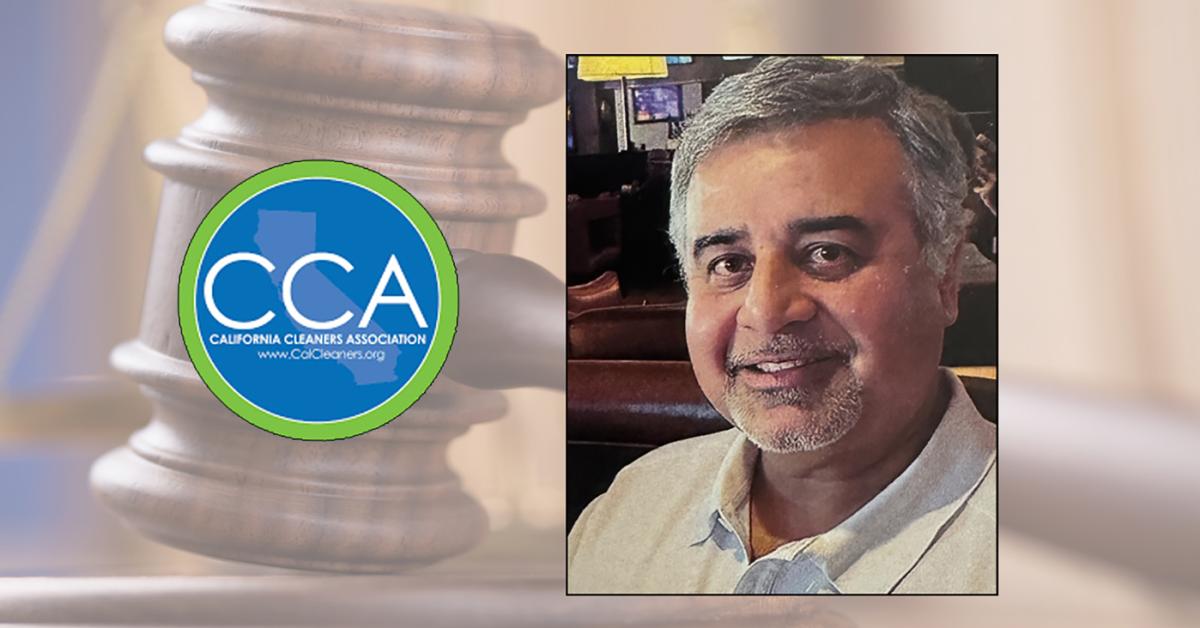GLENDALE, Calif. — During the 2024 Drycleaning & Laundry Expo West, the California Cleaners Association (CCA) installed Ray Rangwala as its new president, succeeding Past President Toran Brown.
Rangwala, principal of Esteem Cleaners in Glendale, has had a long career in the drycleaning industry, and been a member of both the CCA and the SoCal Cleaners Association for the past two decades.
In addition to his work in the cleaning field, Rangwala also dedicates himself to supporting charities such as the Field of Honor and Gratitude event (which places flags in Glendale’s Forest Lawn Memorial Park to honor veterans) and the Three Amigos Orphanage Foundation near Ensenada, Baja, Calif.
American Drycleaner recently sat down with Rangwala to discuss his past and where he sees the CCA — and the drycleaning industry — headed during his two-year term.
ADC: Tell us about your career. How did you get your start in the industry?
RR: I came here from India with my family when I was 17 years old. It was a big family dream — we would come to America, start some kind of business and try to be successful. The most important part was coming to America. The rest of the plan was fuzzy.
Originally, we tried to buy a 7-Eleven because a bunch of Indians who we knew had done that, and they showed us what they had learned. So, we put down a deposit check and earnest money and started picking locations, but then (7-Eleven) turned us down. So, the biggest thing on my résumé was that I was a 7-Eleven reject (laughs).
We bought a turnkey drycleaning store which was started by the people who owned a bunch of retail coin-op laundry locations. They were called Laundry Land, and they were trying to do in the drycleaning business what they had done in the coin-op laundromat business by opening stores across Southern California. They were building one in every shopping center, it seemed, and they were looking for people. In the Los Angeles Times, there was a “business opportunity section” where they had ads saying, “Be Your Own Boss, Own a Drycleaner.”
It was a brand-new business with no customers. We bought it, thinking my father would be the one to run it. He had been a painting contractor in India with his own business. We were trying to start it for him, and my brother and I would eventually work somewhere else. It ended up, though, that I had to continue to help my father because he wasn’t used to the American way of doing things.
ADC: Can you tell us about your work with the Field of Honor and Gratitude and the Three Amigos Orphanage Foundation? Why is charity and philanthropy important to you?
RR: It started when I became a member of the Rotary Club, which is a local service organization. A customer said to me, “Hey, come to these meetings. You’ll get some business.” I did, but at the same time, it made me a better person — I learned that the more you give back, the more you gain. I found that was really good for me at that time, as far as becoming the person I wanted to be.
I started as a participant, going to the orphanage about 24 years ago, and now we’re helping to finance some of the projects at the orphanage on a consistent basis.
As a kid, about 5 or 6 years old, I saw a movie called “Oliver Twist,” which was based on the Charles Dickens novel. Young Oliver was picking pockets, trying to make a living. When the part came where Oliver was in the orphanage and said he was hungry, I started crying, to the point where I was kicked out of the movie theater. I think that stayed with me.
ADC: Why did you want to take a leadership role in the CCA?
RR: The CCA, like all associations, has problems where we’ve seen so much shrinkage in the membership level. Southern California has the highest density of dry cleaners in the country, so we had a lot of competition, but now the numbers are getting smaller and smaller. There’s not enough demand because of COVID, or maybe there’s too much supply because of the number of dry cleaners. We need the help in the industry. The industry has been good to me, and now I think it’s my turn to give back.
ADC: What do you see as CCA’s most important role in supporting its members?
RR: One of our biggest jobs is to come up with good meetings which are of value to our drycleaning members. That might be sharing information about chemistry and taking out stains; management lessons; bar-coding tutorials; or other aspects of our industry. We can have vendors talking to us about detergents and the equipment or supplies they sell. It’s important that, as an association, we help them and they help us, because they need us, and we need them. We need to learn from our vendors and our suppliers so that it’s a win-win combination for all of us.
So many of us operate from 7 a.m. to 7 p.m. six days a week, and there’s a shortage of time. Many don’t have the time to go to a meeting to learn about dry cleaning because they’ve already worked 12 hours that day. Who’s going to teach them anything? But the truth is, that’s the biggest fallacy we all face. We’ve all learned habits, and some of them are bad habits.
There are some dry cleaners who, when they buy the business, learn from the guy who sold it to them. What if that guy had bad habits and you just carry them on? Nobody’s really giving you a new foundation for how to learn — how to do what you’re supposed to do — on a macro level. It’s important to learn.
Come back Tuesday as our interview concludes with Rangwala sharing his thoughts on industry challenges, emerging trends, and more
Have a question or comment? E-mail our editor Dave Davis at [email protected].












